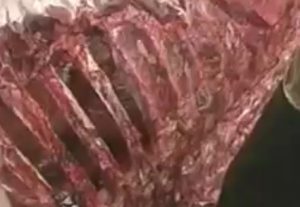
(Anchorage) — Hunting seasons are in full swing and many Alaskans are returning from days afield with moose, caribou, Dall sheep and other game ready for processing and storage in the freezer. Along the way, one problem successful hunters must consider is how to properly dispose of meat scraps, bones and hides.
Proper disposal isn’t difficult, said Assistant Anchorage Area wildlife Biologist Cory Stantorf. What’s hard is dealing with brown bears defending leftovers found illegally dumped in public greenbelts or residential areas.
“People don’t always realize how quickly a pile of moose bones and meat scraps can go from an unsightly nuisance to a public safety concern,” said Stantorf.
Stantorf has responded to reports recently of moose and caribou bones, hides and meat trimmings discarded in Anchorage. In one case game waste was left to rot—or draw bears and dogs—in a neighborhood backyard.
And Anchorage is not alone. Residential areas in Kenai, Soldotna and the Matanuska-Susitna Borough also face problems each fall with haphazard game-waste dumping.
“We had a call a not too long ago about a brown bear defending a food cache off Fairview Loop,” said Palmer Wildlife Biologist Tim Peltier.[xyz-ihs snippet=”adsense-body-ad”]Located in the heart of a suburban neighborhood, the situation presented a public safety threat. The bear’s food cache included an illegally dumped buffet of salmon waste and moose scraps. Neighborhood residents were charged by the bear, but luckily no one was injured.
“Unfortunately, this was not an isolated incident,” said Peltier. “I get similar calls every year.”
Problems associated with improperly discarded game waste can extend beyond bear dangers to adversely affect pets, said Kenai Area Wildlife Biologist Jeff Selinger.
“Dogs attracted to bones and meat scraps left in residential areas are susceptible to parasites sometimes found in uncooked game,” he said.
Tapeworms and other parasites can sicken pets and be costly to treat.
As with salmon waste generated by anglers and dipnetters each summer, improperly discarded game waste on public or private property may subject scofflaws to fines ranging from $300 to $1,000. The Alaska Department of Fish and Game does not routinely remove wildlife carcasses, bones and scraps that turn up on private property; this is the property owner’s responsibility. Biologists do respond to reports of aggressive wildlife defending illegal attractants. Often, bears drawn to these sites must be killed.
Entrails and other game waste should be left in the field away from developed areas and out of sight of roads and trails. Meat trimmings, bones and other scraps created when meat is being prepared for processing should be taken to a waste transfer station or local landfill. Another option is to freeze bones and meat scraps to eliminate odors and then place them out with garbage on the morning of trash pickup. Do not place waste out the night before trash pickup.
For information on costs and proper discard procedures, contact your local landfill.
[xyz-ihs snippet=”Adversal-468×60″]
